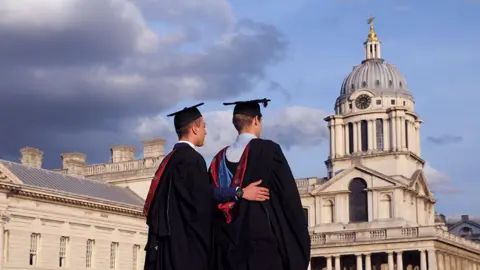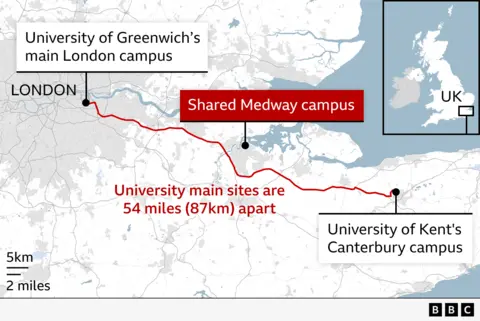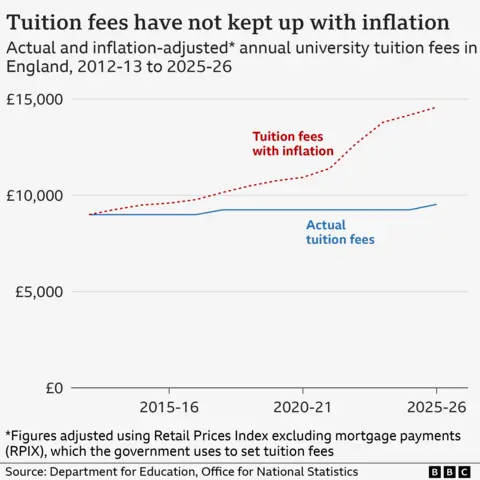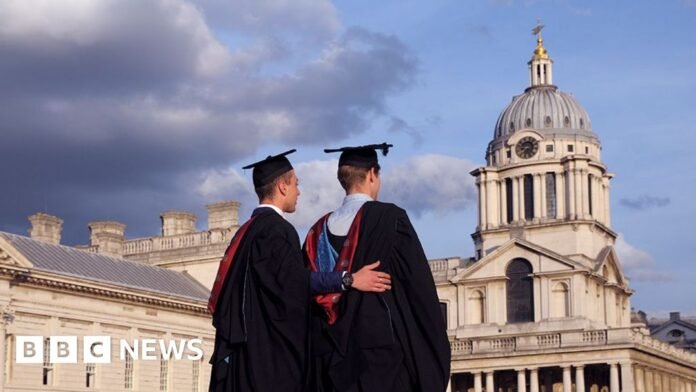Branwen Jeffreys Education editor
 Universal Images Group via Getty Images
Universal Images Group via Getty ImagesThe UK’s first “super-university”, stretching across an entire region, is to be created through the merger of the universities of Kent and Greenwich, the BBC has learned.
Under the proposed name of London and South East University Group, the single institution will have one vice-chancellor from the academic year starting in autumn 2026.
The Office for Students, England’s higher education regulator, welcomed the move and suggested more universities may explore similar options as they battle economic challenges, with 40% of English universities now believed to be in financial deficit.
But the University and College Union told the BBC there would “almost certainly” be redundancies as a result.
UCU’s general secretary Jo Grady says that what is being described as a merger is “a takeover by Greenwich” as Kent was on “the brink of insolvency”.
“I also think this is a broader problem for the sector. Both of these institutions should have been on the government’s radar, and rather than stepping in, we’re seeing that this is how a crisis is managed. This isn’t offering stability to students, to staff or to the sector”, Ms Grady added.
The Department for Education (DfE) said ministers “welcome innovative approaches such as this one”.
This is the first merger of its scale in the UK with the total number of students in the new institution reaching almost 50,000. Smaller mergers like the amalgamation of three colleges within the University of the Highlands and Islands network have happened previously.
The new university will operate across the existing campuses, including in Medway, where students from both Greenwich and Kent already share facilities, including the library.
Kent has one other campus, in Canterbury, about 30 miles (48km) from Medway.
Greenwich has two other campuses, one on the banks of the River Thames in Greenwich itself about 28 miles (45km) from Medway, and the other in Avery Hill, south-east London, about 24 miles (38km) from Medway.
The universities said the combined institution will provide a strong financial foundation to weather the economic challenges facing universities now and in the future.
Speaking exclusively to the BBC, the vice-chancellors of both universities insisted the move was not a takeover, nor driven by a financial crisis for either, although they argued the new university model would be “resilient and financially viable”.

Prof Georgina Randsley de Moura will remain the interim leader of Kent until the merger, when Prof Jane Harrington, who runs Greenwich, will become the vice-chancellor of the new institution.
Prof Randsley de Moura said the “trailblazing model” would enable the universities within the new group to retain their name, identity and campuses.
Prof Harrington said the universities had worked together on the Medway campus for 20 years and now wanted to go further to contribute to the economy across London and the South East.
“This is about taking the best of both universities and saying what do we want to offer to our communities,” she said.
 BBC/Branwen Jeffreys
BBC/Branwen JeffreysFor students, there will be no visible change, with applications continuing as normal to each institution and degrees awarded in the name of Kent or Greenwich.
Prof Harrington said she could tell students “absolutely categorically” they could complete any course they are already enrolled on, including those starting university this autumn.
The universities said there are no immediate plans for job losses, but both have had to make recent cuts.
After hearing the news, some staff in Canterbury this morning told the BBC that it felt “very last minute” and they were concerned for jobs.
Researcher Jack Davis said it was a bit too early to know exactly what it means in terms of restructuring but he could see the benefits of collaborating.
“If other institutions have other bits of kit, it might mean we’re able to foster relations and maybe do experiments there too”, he said.
In May, Greenwich confirmed it was cutting the equivalent of 15 full-time posts by August.
Kent has already started winding down some courses to reduce costs as it posted a deficit for another year in 2024.
The planned merger is likely to provoke anxiety about long-term prospects among staff.
Prof Harrington said she recognised there would be concern about posts, and said they would be saving costs by reducing senior roles.
Across England, job losses at many institutions over the last couple of years have been adding up, with the University and College Union (UCU) estimating the overall number of posts cut is about 5,000.
Mergers, once rare, have become more common, with City St George’s created from two separate parts of the University of London last year.
Most others have involved smaller or specialist institutions.
Alex Stanley from the National Union of Students said these decisions were being made to run universities efficiently and as a result, students were facing cuts to courses and staff ratios were getting worse.
“What we’re seeing with the tuition fee increase coming around the corner, is that students are being asked to pay more for less,” he said.
The plans unveiled on Wednesday are on a bigger scale, with two universities offering a full range of courses and spread over a wider geographical area.
The merger will be watched with interest by other universities looking at ways to collaborate to stabilise their finances.
Tuition fees have increased to £9,535 this academic year, but the real value to universities has fallen because of rising costs since the big uplift 13 years ago increased fees from just over £3,000 to £9,000 a year.
In the last academic year, the number of applications from international students, who pay higher fees, was 16% lower than universities had hoped.
It followed visa restrictions introduced in 2024 which prevented international students bringing family members.

Vivienne Stern, from Universities UK, said the merger was significant, and a sign of how universities were thinking differently.
She said the “slow erosion” of university finances needed to be stopped and the government “was needed on the pitch pretty fast” with longer-term solutions.
Those government plans for the future funding of universities in England are expected later this autumn.
Ministers have already said they are looking at applying a 6% tax on income from international students.
A DfE spokesperson said: “This collaboration shows how strong partnerships in higher education can help enable delivery of world-class teaching and research whilst maintaining the best interests of students.”
Any change on this scale has to be overseen by the OfS, which regulates universities in England, and makes sure students’ studies are not disrupted.
“In any merger, effective communication with students will be crucial,” a spokesperson said.
“Current students will continue to study for the courses they signed up for, and should continue to expect excellent teaching and support.”
Source link 2025-09-10 21:32:00 www.bbc.com https://www.bbc.com/news/articles/cy85905dj2wo?at_medium=RSS&at_campaign=rss



